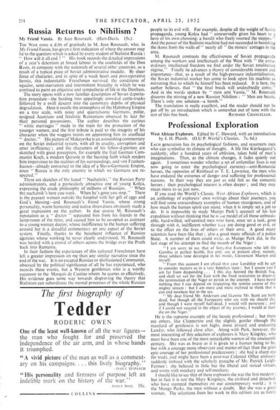Russia Returns to Nihilism ?
My Friend Vassia. By Jean Rounault. (Hart-Davis. 15s.) I
THE West owes a debt of gratitude to M. Jean Rounault, who, in My Friend Vassia, has given a first indication of where the answer may lie to the question which is asked by every student of Stalinist Russia : " How will it all end ? " His book records the detailed impressions of a year's detention at forced labour in the coalfields of the Don B.tsin, in company with the nationals of several other countries, as a result of a typical piece of Soviet administrative muddle. By sheer force of character, and in spite of a weak heart and post-operative hernia, this indomitable Frenchman survived the conditions of squalor, semi-starvation and intermittent brutality in which he was confined to paint an objective and sympathetic of life in the Donbass.
The story opens with a now familiar description of Soviet deporta- tion procedure—the herding into appallingly crowded cattle-trucks followed by a swift descent into the customary depths of physical degradation. Here it recalls the atmosphere of the Habsburg Empire on a tiny scale, with noisy and quarrelsome Germans, polite, resigned Austrians and fatalistic Rumanians obsessed by fear for their personal possessions. The author describes the curious " white marriages " made in the train for the protection of the younger women, and the first tribute is paid to the integrity of his character when the waggon insists on appointing him its unofficial " doctor." His picture of Makeyevka is an astonishing commentary on the Soviet industrial system, with all its crudity, corruption and utter inefficiency ; and the characters of his fellow-deportees are sketched with great perception, for example the frail German Com- munist Koch, a modern Quixote in the burning faith which renders him impervious to the realities of his surroundings, and von Franken- hausen—already converted to the idea of a Slavo-Germanic Empire, since " Russia is the only country in which we Germans are re- spected."
There are sketches of the hated " Nachalniki," the Russian Party administrators, and a particularly attractive one of young Kolya, expressing the crude philosophy of millions of Russians. When the nachalnik's here you work. When he's gone you stop." There is the peasant woman outside the hospital with her gift of eggs and God's blessing—and Rounault's friend Vassia, whose strong personality, warm humanity and native shrewdness obviously made a great impression on the author. In due course M. Rounault's reputation as a " doctor " separated him from his friends in the lamp-room of the mine, and caused him to be co-opted as assistant to a young woman doctor, whose indifference to the human suffering around her is a dreadful commentary on one aspect of the Soviet system. Finally, thanks to the beneficent influence of Russian agencies whose working he never clearly understood, M. Rounault was herded with a crowd of others across the bridge over the Pruth back into Rumania.
In their fashion the experiences of this cultured Frenchman have left a greater impression on me than any similar narrative since the end of the war. It is no escaped Russian or disillusioned Communist, obsessed by the political significance of all he has experienced, who records these events, but a Western gentleman who is a worthy successor to the Marquis de Custine whom he quotes so effectively. His evidence goes some way towards disproving the theory that Stalinism can subordinate the mental processes of the whole Russian people to its evil will. For example, despite all the weight of Soviet propaganda, young Kolya had " unreservedly given his heart to a hero of his own choosing: a bandit who freely roamed the steppes." And the power of the Stalinist machine had not succeeded in banishing the ikons from the walls of " nearly all " the miners' cottages in the area.
M. Rounault contrasts the effectiveness of Soviet propaganda among the workers and intellectuals of the West with " the extra- ordinary inteilectual freedom we find under the Soviet totalitarian regime." Finally he advances a theory of considerable interest and importance—that, as a result of the high-pressure industrialisation, the Soviet industrial worker has come to look upon his machine as mirroring that to which he himself has been reduced. It is here, the author believes, that " the final break will undoubtedly come." And in the words spoken by " mon ami Vassia," M. Rounault discerns the stirring of a new Russian Nihilism : " Men are beasts. There's only one solution—a bomb."
The translation is really excellent, and the reader should not be nut off by an introduction which is somewhat out of tune with the


































 Previous page
Previous page